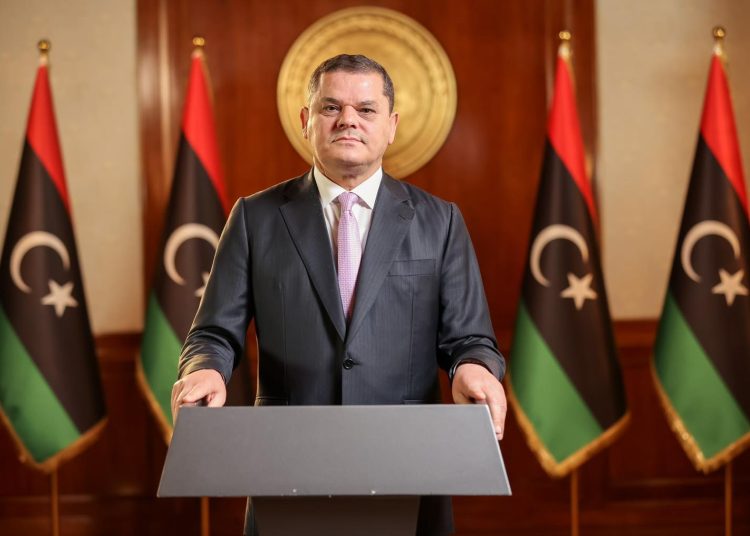Caretaker Prime Minister Abd Alhamid Aldabaiba announced a four-track plan for holding elections and approving the permanent constitution, leading to parliamentary elections next June.
The new political initiative came during a speech broadcast last night during which Aldabaiba talked about the details of his plan called “the return of honesty to the people”.
He said that the House of Representatives’ (HoR) appointment of a new government is a “failed manoeuvre and spoiler of the (current political) scene.”
He considered that the “dominant” political class wants a dangerous path and insists on going to it to escape the elections.
Aldabaiba’s plan included holding parliamentary elections next June, to be preceded by the preparation of a governmental technical committee for a law for those elections, to be submitted to the HoR for approval within two weeks, otherwise the elections will be held according to the old election laws (Law No. 2 of 2021 or No. 4 of 2012).
The plan also includes postponing the presidential elections until the adoption of a permanent constitution.
Aldabaiba called on the HoR to support his parliamentary elections proposal, saying: “I say to the representatives, come to this solution that nullifies force majeure. This solution will remove all of us from the scene, including the Unity Government.”
He said any solution to succeed must be compromised by whoever initiated the solution, and therefore the plan to return the trust to the people will be all existing bodies, on top of which is the Government of National Unity, and this plan will succeed only when everyone agrees to benefit from the opportunity to realize the aspirations of the Libyan people in the elections.
The Caretaker Prime Minister said his solution is the only one before Libya today before the current political class rotates the scene again at the expense of the Libyans, this time the cost will be more serious.
He concluded by saying: “Yes to the parliamentary elections’’, because its law is issued and exists and does not exclude anyone. It will end all current institutions, including this government, restore the trust to its people, and give hope in forming an elected government, renewing legitimacy and ending foreign interference.
Here is Aldabaiba’s four track political road map in more detail:
Track one
This involves the work of the government technical committee on drafting the election law for the purpose of submitting it to the Cabinet, which in turn will refer it to the HoR for approval within two weeks, noting that this track will be granted four weeks with a maximum of 14 March.
In the event that this path is not possible, Aldabaiba said there will be no choice but to implement Law No. 2 of 2021 regarding parliamentary elections or Law No. 4 of 2012 that organized the first legislative elections ‘‘so that there is no excuse for holding the elections.”
Track two
Involves the launch of the electoral process before the end of the preliminary stage of the road map issued by the Libyan Political Dialogue Forum (LPDF), according to a detailed timetable set by the High National Elections Commission (HNEC) in consultation with the government and the Presidential Council, which includes updating the voter register and allocating sufficient time for electoral campaigns.
Track three
Involves conducting a referendum on the draft constitution in accordance with the tenth amendment to the constitutional declaration and the referendum law referred to HNEC, which was reinforced by the Hurghada Agreement in conjunction with the parliamentary elections.
Track four
Involves the option of the use of electronic voting if any party attempts to use force to prevent voting, and this is to be done with complete transparency and international supervision that ensures the safety of voting. Aldabaiba justified this option by saying that all voter registration processes that were previously carried out were conducted electronically through sending SMS messages.









